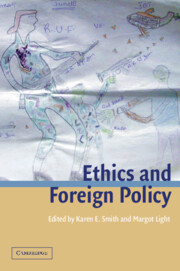Book contents
- Frontmatter
- Contents
- Notes on contributors
- 1 Introduction
- Part I Theories
- Part II Instruments and policies
- 5 Exporting democracy
- 6 Ethical foreign policies and human rights: dilemmas for non-governmental organisations
- 7 The international criminal court
- 8 Constructing an ethical foreign policy: analysis and practice from below
- Part III Case studies
- References
- Index
6 - Ethical foreign policies and human rights: dilemmas for non-governmental organisations
Published online by Cambridge University Press: 22 September 2009
- Frontmatter
- Contents
- Notes on contributors
- 1 Introduction
- Part I Theories
- Part II Instruments and policies
- 5 Exporting democracy
- 6 Ethical foreign policies and human rights: dilemmas for non-governmental organisations
- 7 The international criminal court
- 8 Constructing an ethical foreign policy: analysis and practice from below
- Part III Case studies
- References
- Index
Summary
The problem
The introduction of the 1999 Annual Report on Human Rights of the UK's Foreign and Commonwealth Office (FCO) and the Department for International Development (DFID), which is largely devoted to Kosovo, states:
Within three months of [the 50th anniversary of the Universal Declaration of Human Rights] this Government sent its armed forces into conflict to defend those same rights … Together we stood up for the rights of the people of Kosovo and for the freedoms enshrined in the Declaration. NATO was united in its resolve to defend those rights and the international community was overwhelmingly supportive of our actions … This was not a conflict we wanted. But there could not have been a more vivid way of demonstrating our commitment to human rights as enshrined in the Declaration. (FCO and DFID, 1999: 10–11)
Several commentators in Western societies saw their governments' readiness to use military force to defend human rights, together with other events such as the agreement to establish an international criminal court and the arrest of General Pinochet in London, as marking the dawn of a new era for human rights. For others, however, using force in the name of human rights represented a dramatic step backwards in the efforts that had been made since the Second World War to build a just and humane world order based on respect for human rights and the dignity and worth of each person.
- Type
- Chapter
- Information
- Ethics and Foreign Policy , pp. 93 - 111Publisher: Cambridge University PressPrint publication year: 2001
- 1
- Cited by

